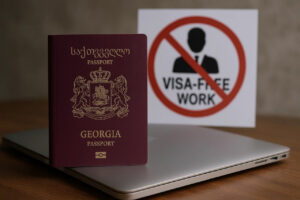
From March 1, 2026, a new system will come into force in Georgia: foreign workers and self-employed persons will need an official work permit.
Previously, the country did not have a full-fledged work permit regime and in most cases allowed foreigners to work without a separate permit, according to industry sources.
According to the business press, there will be a transition period for foreigners already employed in Georgia: they must obtain a permit before January 1, 2027; fines will be imposed on both the employee and the employer for violations (with increased penalties for repeat offenses).
The aim of the reform is to bring order to the labor market, put an end to work on tourist visas, and bring regulation closer to international practice. Additionally, it is reported that the details of the procedure (categories, exceptions, lists of documents) will be specified in subordinate government acts.
In 2024, 135,800 immigrants entered Georgia (–34% y/y), while 121,400 emigrants left the country; 48.2% of immigrants are Georgian citizens, the rest are foreigners. Among foreign citizens, the top countries were Russia, Ukraine, Turkey, India, and Azerbaijan.
Officially, in 2022, 62,300 Russians were registered as immigrants (i.e., they remained to live in the country). In 2023, there were 52,600 Russian citizens among immigrants.
According to media reports and think tanks, in 2025, there will be about 100,000 Russians living in the country (estimates vary widely, taking into account the outflow in 2023). At the same time, only about 20% of them have “tax resident”/official resident status, according to the National Bank of Georgia.
According to the UN, since the start of the full-scale war, approximately 245,000 Ukrainians have passed through Georgia; about 26,600 currently reside in the country (estimate for spring 2025).
Among the largest sources of migration in 2023 are Turkey (≈8,600 immigrants), India (≈8,400), and Belarus (≈3,600); Ukraine provided ≈7,500 immigrants in 2023. These figures show the annual inflow, not the “stock” of permanent residents.
The labor market reform complements earlier changes in migration regulation (e.g., an increase in the minimum property value for a “residence permit by purchase” from $100,000 to $150,000 as of March 1, 2026).
Experts expect that the unification of employment rules will increase the transparency of hiring foreigners and reduce informal employment, but will increase the administrative burden on businesses during the adaptation period.
https://t.me/relocationrs/1390

Given the closure of transit through the territory of Belarus and the Russian Federation, as well as an increase in the number of freight transportation by road, a number of restrictions are being removed or adjusted from April 4, 2022, the Ministry of Infrastructure of Ukraine announced on its Facebook page on Monday.
The period of validity of the electronic application for permits has been extended from seven to 10 days, the ministry said.
In addition, the following changes have been adopted for carriers: Poland – increased to five permits of all types per vehicle from April to May, the Czech Republic – increased to two permits of all types but one vehicle up to 10 tonnes (for a month), Serbia – the restriction on travel across the country for vehicles up to 10 tonnes has been lifted, Romania – temporary registration of permits of the Organization of the Black Sea Economic Cooperation to Georgia, Azerbaijan, Kazakhstan, Uzbekistan for vehicles of the ecological standard Euro-3 and higher.
The ministry said that from the very beginning of the war, it has been conducting systemic negotiations with partner countries on the abolition of the permit system for the period of martial law.
“As of April 4, we managed to agree on the cancellation of bilateral and transit permits for transportation through the territory of six countries of the European Union, in particular from Bulgaria, Hungary, Italy, Denmark, Latvia, Estonia, as well as through the territory of Georgia and Turkey. Slovakia also provided transportation without permits,” the report says.
In addition, as noted, a mechanism has been established for permit-free passage of all humanitarian cargo with Moldova, Romania, Slovenia, Austria, the Czech Republic, Poland, Germany, the Netherlands and Lithuania.

New quarantine rules will take effect in the country from August 1, Health Minister Maksym Stepanov said during a press briefing in Kyiv on Wednesday.
“From August 1, new rules regarding quarantine restrictions begin to operate in Ukraine. We have made a distribution into four zones, each will have different restrictions. The softest will be in the ‘green’ zone – mask mode, keeping a distance, one person per 5 square meters at public events, when visiting cinemas and theaters, the occupancy of the hall is no more than 50%, in public transport transportation is exclusively within the seating area. Regarding the crossing of the border between the ‘red’ and ‘green’ zones within the country, traffic will be limited in the ‘red’ zone, appropriate posts will be set up at the crossing,” he said.
The minister stressed that new rules are introduced for the division of countries into “red” and “green” zones.
“Regarding the arrival from abroad from August 1, the statistics will be updated every seven days. We will also change the indicators – if we are currently measuring the number of active patients in the country, then from August 1 this will happen like in European countries. There will be two indicators – if the increase in patients over the past 14 days exceeds such an increase in the territory of Ukraine and if the percentage of increase in the last 14 days compared to the previous 14 days is more than 30 people,” Stepanov said.

PJSC Donbasenergo counts on continuation of initiatives of the regulator, profile ministries and the Verkhovna Rada committee to introduce the best global practices in the operation of the new electricity market, which would allow stabilizing the operation of electricity generating companies. According to a press release of the company, Donbasenergo notes the importance of the initiatives already implemented regarding price adjustment in the balancing market, which made it possible to provide this service without incurring losses.
“At the same time, the market situation for electricity generating companies remains difficult, in particular, only in December, the company’s losses amounted to UAH 130 million,” the company said.
Donbasenergo expressed the hope that the Ministry of Energy and Environment Protection, the regulator, the Verkhovna Rada committee on energy, housing and utilities will continue implementing the best global practices, and companies operating in the electricity generation market will be able to avoid artificially lower prices as well as unprofitable work in the future,” the company said in the press release.
Donbasenergo operates Starobesheve (located in the occupied territory) and Sloviansk thermal power plants (TPPs).
PrJSC Energoinvest Holding owns 60.86% of shares in Donbasenergo, and the state holds 25% of the shares in the company.

The Cabinet of Ministers on Wednesday amended resolution No. 374 dated May 26, 2005 on the approval of the rules of the public registration of medicines.
According to the document posted on the government’s website, the government improved the rules of the public registration or re-registration of medicines, in particular, the rules of providing access to the results of their clinical trials and obliged the Health Ministry to publish all the results of the nonclinical and clinical trials for medicines.
In addition, the government extended the registration certificates of medicines to be procured by international organizations using national budget funds, and canceled the mandatory provision of a GMP document for re-registration.
These changes will ensure free access to information on the medicine and eliminate the risks associated with disruptions in medicine supplies due to the delay of the public registration caused by the updating of the GMP certificates.